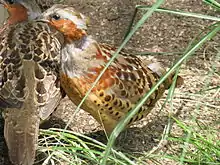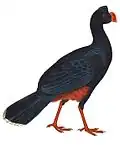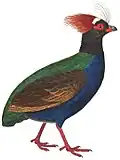| Bamboo partridges | |
|---|---|
 | |
| Chinese bamboo partridge (Bambusicola thoracicus) | |
| Scientific classification | |
| Domain: | Eukaryota |
| Kingdom: | Animalia |
| Phylum: | Chordata |
| Class: | Aves |
| Order: | Galliformes |
| Family: | Phasianidae |
| Tribe: | Gallini |
| Genus: | Bambusicola Gould, 1863 |
| Type species | |
| Perdix thoracica[1] Temminck, 1815 | |
| Species | |
|
see text | |
Bamboo partridges, sometimes called ridge partridges, are medium-sized non-migratory birds of the genus Bambusicola in the family Phasianidae.They have a wide native distribution throughout Asia. They were formerly grouped in the Perdicinae subfamily of the Phasianidae (pheasants, quail, etc.). However, molecular research suggests that partridges are not a distinct taxon within the family Phasianidae, but that some species are closer to the pheasants, while others are closer to the junglefowl. Phylogenetic evidence supports the bamboo partridges as being the sister genus to the junglefowl.[2]
Species
There are three species in the genus:
| Image | Common Name | Scientific name | Distribution |
|---|---|---|---|
 | Mountain bamboo partridge | Bambusicola fytchii[3][4] | Bangladesh, Tibet, India, Laos, Myanmar, Thailand, and Vietnam. |
 | Chinese bamboo partridge | Bambusicola thoracicus[5] | East China, introduced to Japan. |
 | Taiwan bamboo partridge | Bambusicola sonorivox[6] | Taiwan. |
References
- ↑ "Phasianidae". aviansystematics.org. The Trust for Avian Systematics. Retrieved 2023-08-05.
- ↑ "Galliformes". bird-phylogeny (in German). Retrieved 2021-08-02.
- ↑ "Mountain Bamboo-partridge: Bambusicola fytchii". IUCN Red List of Threatened Species. 1 October 2016. 1 October 2016. Retrieved 18 April 2019.
- ↑ "Mountain bamboo-partridge | Twycross Zoo | World Primate Centre". www.twycrosszoo.org. Archived from the original on 29 October 2013. Retrieved 12 January 2022.
- ↑ BirdLife International (2016). "Bambusicola thoracicus". IUCN Red List of Threatened Species. 2016: e.T22725191A94887004. doi:10.2305/IUCN.UK.2016-3.RLTS.T22725191A94887004.en. Retrieved 16 November 2021.
- ↑ BirdLife International (2016). "Bambusicola sonorivox". IUCN Red List of Threatened Species. 2016: e.T22725205A94887202. doi:10.2305/IUCN.UK.2016-3.RLTS.T22725205A94887202.en. Retrieved 16 November 2021.
This article is issued from Wikipedia. The text is licensed under Creative Commons - Attribution - Sharealike. Additional terms may apply for the media files.


